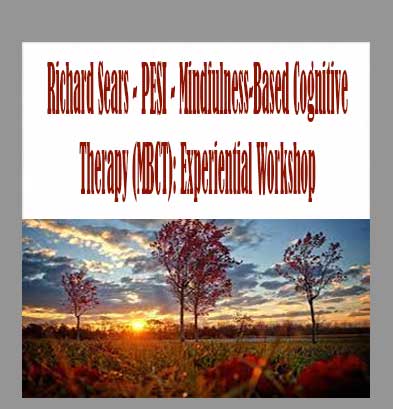Description
Richard Sears – PESI – Mindfulness-Based Cognitive Therapy (MBCT): Experiential Workshop download, Richard Sears – PESI – Mindfulness-Based Cognitive Therapy (MBCT): Experiential Workshop review, Richard Sears – PESI – Mindfulness-Based Cognitive Therapy (MBCT): Experiential Workshop free
Richard Sears – PESI – Mindfulness-Based Cognitive Therapy (MBCT): Experiential Workshop
Are you like many other frustrated clinicians, wanting to incorporate mindfulness into your therapy practice but struggling to do so? All around you are mindfulness articles and workshops that are ineffective to give you concrete, practical skills to help your clients.
Take action today! An emerging evidence-based approach, called Mindfulness-Based Cognitive Therapy (MBCT) has proven effectiveness.
In this new experiential workshop recording, immerse yourself in the entire MBCT curriculum, an 8 session structured program that combines mindfulness and cognitive therapy techniques.
MBCT is evidenced based, and is an advanced clinical version of the popular Mindfulness Based Stress Reduction (MBSR).
Expert trainer Dr. Richard Sears will personally guide you step by step through core competencies of MBCT with passion, humor, and wisdom from his 30 years of teaching mindfulness. He will show you proven strategies for a wide range of psychological disorders, including:
- PTSD
- Anxiety
- Chronic pain
- Addictions
- Depression
- And MORE!
Add this treatment approach to your toolbox to use with individual clients or group therapy. No stressing, just follow the 8 sessions laid out in this recording!
Speaker
Richard W. Sears, PsyD, Ph.D., MBA, ABPP, has given hundreds of workshops on ACT all around the world. He is a board-certified clinical psychologist in Cincinnati, Ohio, where he runs a private therapy and consultation practice, and is Director of the Center for Clinical Mindfulness & Meditation. He holds several academic appointments, including the Department of Clinical Psychiatry & Behavioral Neurosciences with the UC College of Medicine. Dr. Sears is also a psychologist contractor with the Cincinnati VA Medical Center and with Alliance Integrative Medicine.
Dr. Sears is the author of over a dozen books, including ACT with Anxiety; The CBT & Mindfulness Toolbox and Mindfulness: Living Through Challenges and Enriching Your Life. He is also a sixth-degree black belt in Ninjutsu and once served as a personal protection agent for the Dalai Lama of Tibet. He has a PhD in Buddhist Studies, and received ordination in three traditions, as well as recognition as a Zen master.
Speaker Disclosures:
Financial: Dr. Richard Sears maintains a private practice and has employment relationships with the University of Cincinnati and Wright State University. He receives compensation as a consultant. Dr. Sears receives royalties as a published author. He receives a speaking honorarium, recording, and book royalties from PESI, Inc. He has no relevant financial relationships with ineligible organizations.
Non-financial: Dr. Richard Sears is the founder and director of the Center for Clinical Mindfulness and Meditation and is a member of the American Board of Professional Psychology, the Academy of the American Board of Clinical Psychology, and the Association for Contextual Behavioral Sciences. He is a peer reviewer for Mindfulness and a book reviewer for John Wiley & Sons, Inc, and Routledge.
Objectives
- Compile the underlying mechanisms that make mindfulness techniques effective for stress, depression, anxiety, trauma, pain, and addiction.
- Breakdown the role of thoughts in perpetuating symptoms of stress, anxiety, and depression as it relates to ruminating thoughts and behaviors in clients.
- Describe the brain changes associated with mindfulness practice to explain to clients the scientific effectiveness of practicing mindfulness.
- Connect how mindfulness builds upon and refines the evidence-based principles of Cognitive-Behavioral Therapy (CBT).
- Incorporate mindfulness practices into traditional CBT thought records to help alleviate clients of intrusive, obsessive compulsive thoughts.
- Utilize specific mindfulness-based techniques to help clients disengage from the narrative of negative thoughts and emotions.
- Organize the eight session structure used MBCT program in your own clinical setting.
- Differentiate between the group process in MBCT vs. CBT to avoid clients’ cycles of struggling with distressing thoughts and feelings.
- Practice guiding a client through a 3-minute mindfulness exercise to improve the consistency of conscious choices rather than automatic reactions when distressed.
- Explore the use of decentering skills with a client, in a session, in the reduction of worry and ruminations.
- Apply the three steps of the mindful inquiry process, after the mindfulness exercise is over, to help clients more quickly internalize the skills and attitudes that allows them let go of struggle and make conscious choices.
- Adapt the MBCT curriculum to different client populations, including children, as it relates to treatment considerations.
Outline
Competencies of MBCT
- Foundations of MBCT
Mindfulness-Based Stress Reduction (MBSR)
Original MBCT trials
Evidence base for MBCT
Neurological evidence - Principles
Adaptation and expansion of CBT principles
Decenter from strong and persistent negative thoughts
Leading mindfulness exercises skillfully
Mindful inquiry
MBCT Curriculum & Core Therapeutic Tasks
- Session 1: Awareness and Automatic Pilot
Raisin exercise – distinguish thinking and feeling
Body scan – foundation to build attention
Mindfulness of daily activities - Session 2: Living in Our Heads
ABC model for linking thoughts and emotions
Pleasant events calendar to foster attention to the positive
Mindful breathing for stress and focus - Session 3: Gathering the Scattered Mind
Mindful stretching for working with discomfort
Mindful walking for dynamic mindfulness
Unpleasant events calendar to relate differently to difficulty
3-Minute breathing space - Session 4: Recognizing Aversion
Mindfulness of breath, body, sounds to deepen awareness
Working with difficulties without struggle - Session 5: Allowing/Letting Be
Exposure to difficult thoughts and feelings to transform them
Noticing thoughts without getting lost in them - Session 6: Thoughts are Not Facts
Purposefully exposing to strong thoughts and feelings
Techniques for working wisely with difficult thoughts - Session 7: How Can I Best Take Care of Myself?
Recognize relapse signatures to prevent future problems
Develop self-care action plans - Session 8: Maintaining and Extending New Learning
Personalize mindfulness practices for individual clients
Maintain momentum of positive gains
Clinical Issues – Advanced Strategies for Working with Challenging Clients
- Adaptations of MBCT for:
Depression
Stress
Anxiety
Chronic Pain
PTSD
Substance Use Disorders
Children & Adolescents
Limitations of the Research & Potential Risks
- Most research has been done in group settings
- Best when clients have the cognitive capacity to engage in the practices
- Adaptations must be made for acute conditions and special populations
- Mindfulness involves moving into experiences, which may cause a temporary exacerbation of symptoms
Evaluations and Dissemination
Target Audience
- Counselors
- Social Workers
- Psychologists
- Case Managers
- Addiction Counselors
- Occupational Therapists
- Marriage & Family Therapists
- Psychotherapists
- Nurses
- Other Mental Health Professionals
Frequently Asked Questions:
- Innovative Business Model:
- Embrace the reality of a genuine business! Our approach involves forming a group buy, where we collectively share the costs among members. Using these funds, we purchase sought-after courses from sale pages and make them accessible to individuals facing financial constraints. Despite potential reservations from the authors, our customers appreciate the affordability and accessibility we provide.
- The Legal Landscape: Yes and No:
- The legality of our operations falls into a gray area. While we lack explicit approval from the course authors for resale, there’s a technicality at play. When procuring the course, the author didn’t specify any restrictions on resale. This legal nuance presents both an opportunity for us and a boon for those seeking budget-friendly access.
- Quality Assurance: Unveiling the Real Deal:
- Delving into the heart of the matter – quality. Acquiring the course directly from the sale page ensures that all documents and materials are identical to those obtained through conventional means. However, our differentiator lies in going beyond personal study; we take an extra step by reselling. It’s important to note that we are not the official course providers, meaning certain premium services aren’t included in our package:
- No coaching calls or scheduled sessions with the author.
- No access to the author’s private Facebook group or web portal.
- No entry to the author’s exclusive membership forum.
- No direct email support from the author or their team.
We operate independently, aiming to bridge the affordability gap without the additional services offered by official course channels. Your understanding of our unique approach is greatly appreciated.
- Delving into the heart of the matter – quality. Acquiring the course directly from the sale page ensures that all documents and materials are identical to those obtained through conventional means. However, our differentiator lies in going beyond personal study; we take an extra step by reselling. It’s important to note that we are not the official course providers, meaning certain premium services aren’t included in our package:
Refund is acceptable:
- Firstly, item is not as explained
- Secondly, Item do not work the way it should.
- Thirdly, and most importantly, support extension can not be used.
Thank you for choosing us! We’re so happy that you feel comfortable enough with us to forward your business here.








Reviews
There are no reviews yet.